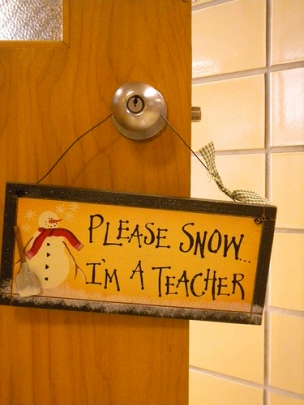During last week’s polar vortex, while Denver was scarcely affected, I kept my pulse on the snowpacalypse through my Facebook friends and in chats with my niece and nephews in Missouri. Not for the first time, I realized there might be a lesson in people’s reactions to unexpected school closures.
 From the kids’ point of view, of course, there is much rejoicing upon every blessed snow day. And that’s what really struck me: the jubilation we simply expect from students (and, I dare say, some teachers) when they’re granted a furlough from what is, for many of them, a factory of stress and/or boredom. Why do so many adults so readily dismiss this joyful relief as a childish reaction?
From the kids’ point of view, of course, there is much rejoicing upon every blessed snow day. And that’s what really struck me: the jubilation we simply expect from students (and, I dare say, some teachers) when they’re granted a furlough from what is, for many of them, a factory of stress and/or boredom. Why do so many adults so readily dismiss this joyful relief as a childish reaction?
Maybe I’m wrong, but I suspect that if we adults disliked our jobs as much as these kids dislike school, most of us would quit. At the very least, we might well bristle if some well-meaning friend responded to our criticisms of our job with something like “it’s for your own good, you know. This kind of suffering builds character; you really should stick it out.” (Right…and I’ll thank you for this someday, it’s harder for you than it is for me, etc.) We wouldn’t accept pressure or bribes to stay in a bad work situation—so why do we routinely do this sort of thing to our kids?
Indeed, why are we so dismissive of the unhappiness of children? Is it the selective memory of adulthood, decades removed from a disempowering school career? Do we honestly believe that the best way to prepare children for a successful future is by making their education as difficult and unpleasant as possible? (See Alfie Kohn’s post “Getting hit on the head lessons” for more on this disturbing attitude.) In the face of such willingness to discount students’ emotional well-being, I’m reminded of Frederick Douglass’s saying that “it is easier to build strong children than to repair broken men.” We use the supposed end (the capacity to handle adversity) to justify the means (miserable, stressed children). To me, this seems as unwise as it is unwarranted.
For their part, the snow-bound parents’ posts were decidedly less jubilant than the remarks I heard from the younger crowd. Extended snow days struck them as quite the opposite of relief, anything but a vacation. No doubt, cabin fever and sibling rivalry played their parts in this, but I can’t help wondering whether—in some cases, at least—the culture of conventional schooling made things worse. What I mean is this: I’ve long noticed that Sudbury students seem much better at scheduling their own days and fending for themselves than other young people I’ve known. They seem far less dependent on adults to provide structure and feedback, much less thrown off when that external support is withdrawn. This holds true both on days off from school and after schooling’s conclusion, when these young adults strike out on their own.
There’s a tradeoff I’ve heard all too often in my years of Sudbury staffing that goes something like this: yes, I see that my child is seriously unhappy in their school—but if I don’t push them to tough it out, their suffering will be even worse in the long run. Well, if that sounds familiar, then listen to this good news: you don’t have to make this choice! Over four decades of Sudbury schooling demonstrate that, to echo Frederick Douglas, happy children will grow into strong, healthy, capable adults.
I don’t mean to downplay the difficulties of parenting, especially a houseful of cooped-up, restless natives. As people around the country dig out and thaw out from last week’s storms, I simply want us to consider that maybe honoring our children’s negative reactions to school is, both now and in the long run, the best possible course of action.
